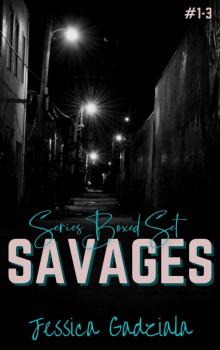- Home
- Gadziala, Jessica
The General Page 14
The General Read online
Page 14
And while I didn't like the idea of her being nervous, I liked that she felt free to show that she was.
So I left her to her thoughts as I focused on not sending us flying into a tree on the snow that was slushy and slippery, making the back tires of her luxury crossover fishtail if I went over ten miles an hour.
It felt like ages before we reemerged to the main drag, turning the car toward the parkway, and going a bit over the speed limit in the hopes that she would feel better as we got close.
I could barely get the car into a space and cut the engine before she was out the door, walking too quickly in those stilts, making me jog to catch up, snagging her elbow gently, but firmly enough to make sure she didn't end up flat on her face on the choppy concrete and rock salt.
I didn't know what the Jackson Rehabilitation Hospital was. But any ideas of it being rehab slipped away when we went inside and the security was lax, no one trying to keep junkies or drunks inside like they were court appointed to do.
It was just like any other hospital.
"Mrs. Ericsson," the kindly nurse in light blue greeted her when she walked up to sign in. "We were worried you weren't going to make it today. Of course, everyone would have understood," she added, giving her an apologetic look.
"I'm sorry I'm late. Did I miss him?"
"No. He just went in actually."
"Good," she said, turning, rushing away from me.
"Wait," the nurse said, stopping me. "You need to sign in too."
I looked down at the form, seeing I was supposed to put my name and the name of the person I was visiting, but Jenny's writing was so fast and frantic that I could barely make anything out.
"I'm Mrs. Ericsson's security detail. I'm afraid she forgot to tell me who we are here visiting."
"Security. Of course. Of course. She's visiting Bobby Eames," she supplied in a low voice, knowing she wasn't supposed to, but doing me - and Jenny - a solid.
"Thank you," I said, filling the form in.
"Room ten. All the way at the end of the hall," she told me before dismissing me to answer the phone.
What struck me most was the silence.
Aside from the predictable muted sound of rubber-soled nursing shoes, phones ringing, and the little beeps of machines, there was nothing.
No talking.
No TVs on.
Nothing.
Curious, I stopped in the door at the room at the end of the hall, finding a doctor standing with his back to me, tall, graying, talking in what could only be called soothing tones to Jenny whose arms were crossed over her chest, her hand raised to pull at the pearl at her earlobe.
"As I said last month, Mrs. Ericsson, I am afraid there is likely never going to be any new news for me to give you."
"I understand, but I still want to have you dropping in each month. Even if you never find anything new to tell me. You never know. The nurses told me that you never know. Miracles happen."
The doctor took a deep breath. From behind him, it seemed like a sigh. Like he was trying to find patience.
"They really shouldn't be saying those kinds of things. We run on science here. And the science, the medicine, says this is as good as we can expect."
Jenny's shoulders fell, and I had an uncharacteristic urge to grab the good doctor by the back of his neck and shake him, demanding he not kill what little hope the woman obviously had, remind him that she had clearly been through enough, that it wasn't a terrible thing for people to have some goddamn hope in life.
"Thank you again, doctor," Jenny said, her tone trembling a bit, and when I looked closer, she was fighting back tears.
"I will see you next month," he said, sounding frustrated, but resigned as he turned.
I didn't know him from Adam. And, sure, maybe he was just trying to be realistic, but I gave him a hard look as he moved past me anyway, hoping he took it for what it was. A silent warning. To use kid gloves with her in the future.
"I'm sorry I was crazy this morning," Jenny said, voice low.
"Stop apologizing," I demanded softly, moving in since she seemed set on staying where she was.
When I passed the white curtain giving the bed privacy from the open door, I found a man lying in the oversized bed, body made small by likely being there a good, long time, his face drawn, his skin pale, maybe even a little jaundiced. Vitamin D was great, but there was no substitute for some actual sunlight. And with the high tree line outside his bedroom casting the whole side of the building in shadow, I doubt any came in through the panes.
He was older, past middle age with steel gray mixed in his blond hair. I didn't have to see his eyes opened to know they were blue. Bright blue. A color Jenny had inherited.
Bobby Eames.
Jenny's father.
And he was in a bed in a rehabilitation center with a doctor who said he was never going to improve.
"Jenny..." I said, moving toward where she had rested her ass on the edge of the window seat.
"It's my dad," she told me, her eyes on him as she spoke.
"What happened?"
She shook her head at that, closing her eyes, taking a deep breath. "My mom was driving them back from the bar. He was drunk. He didn't realize she was drunker."
Shit.
I knew where this was heading.
But she seemed to need to say it.
Because she likely wasn't allowed to normally. It wouldn't fit the right image. Drunk parents in a car accident.
What might the voters think?
Never mind that Jenny clearly needed to ease the burden of knowledge, share the facts with someone.
I moved over toward the window, lowering myself down next to her, pressing a hand to her knee, giving it a reassuring squeeze.
"They were upset because they weren't invited to the wedding," she told me, pressing her lips together as her eyes closed, trying to hold it together. "And they got drunk and didn't call a cab because, well, there was likely no money left after the bar. So my mom drove, took a turn too sharp, plowed through a guardrail, and the car fell into a ditch fifteen feet below."
"Fuck, sweetheart," I said, moving my arm around her back instead, pulling her closer.
"She died at impact. They airlifted my father. He had all kinds of surgeries. Had compound fractures in both legs, a punctured lung, his arm bones had nearly crumbled, three busted ribs. And he hit his head. They didn't worry so much about the head right away. They told me head wounds were funny. They acted unpredictably. They said we just had to wait for the swelling to go down to really get an idea of how things might be."
"He had swelling in his brain?" I asked, knowing what that meant, knowing how many men I had known to have suffered that in the service.
"Traumatic Brain Injury is his official diagnosis. Not that it means anything. It's a... what's the term they used..."
"Umbrella diagnosis," I supplied. "It encompasses dozens - hundreds - of things."
"Exactly."
"Is he..." Was there a nice way to say braindead?
"No," she said, shaking her head, knowing where my mind was. "No. He has brain activity. Actually, when he's awake, you might not even realize anything is wrong right away."
"But there is," I prompted, letting her know it was okay to share the details, that she didn't need to keep them all buried inside.
"Sometimes, it is little things. Confusion. Memory issues. He has trouble finding the words he wants, or understanding yours at times. Sometimes he doesn't even know who I am, is annoyed at me for being here. The mood swings are one of the worst things. My father was a pushover in life, letting my mom bully him around a lot since she was such a strong personality, but he was always soft, kind. Now... now he's unpredictable. Violent. Angry. He lashes out at the nurses, the doctors, me."
"So bad that he needs to be here permanently?" I asked, never being a fan of people being committed to hospitals for their lives.
"Some days you might think so. But he's here because he seizes. Unpredi
ctably. There's no rhyme or reason to it. He will be sitting there just talking, then he will be shaking violently. Sometimes it happens if he tries to stand - though he never really recovered from the leg fractures. He doesn't walk well. Can't hold his weight for more than a few minutes. But if he was on his own - or if he had a live-in who just walked away to go to the bathroom, and he decided to get up and seized, he could fall. And if he hit his head again, the doctors are sure he wouldn't survive." She took and let out a deep breath. "Not that I think he wants to live like this, but I just... I couldn't live with myself if that happened just because I didn't like him being in a hospital."
"You come here often to visit?"
"Every week after the club," she told me. "For a few hours. And then when Dr. Patterson is here. Even though, clearly, he is sick of me hoping for new news."
"It's his job to check on him, to answer your questions. Fuck him if he gives you attitude. He's getting paid for his time." We fell silent for a long time, both of us watching the rise and fall of her father's chest, calm in sleep even if he was unpredictable when he was conscious. "It's not your fault, Jenny," I told her, knowing to my marrow that no one had told her that, that she desperately needed to hear it, know it, start to believe it.
"It is," she countered, shaking her head. "I didn't even try to fight, didn't try to demand they be invited despite Teddy and the senator's objections. I was... young. And I was surrounded by all these worldly adults who were telling me all the reasons it was a bad idea. And I just... caved. I didn't invite them. I didn't even tell them when I was getting married. They found out because it was in the paper. It was my fault that they were upset."
"You didn't put the drinks in front of them. You didn't press the keys into their hands and tell them to drive home even though they couldn't walk a straight line. You didn't do any of that. Those were their choices. You can't be at fault for someone else's poor decisions. And I know that sounds harsh given the situation, but it's the truth."
"I still should have insisted."
"How old were you?"
"Eighteen," she supplied, shrugging it off.
But it wasn't something to shrug off. Sure, the government thought it was old enough when I had enlisted. But, looking back with a mature mind, it wasn't. Not old enough to give my future to those who'd make me kill even when I didn't agree with it.
And it damn sure wasn't old enough to sign your future over to the devil in man's clothing. One who had been courting her when she was underage.
"You didn't know any better," I told her, curling her deeper into my side. "And the way the senator acts now, I see that there was no way you stood a chance against him at that age, as green as you were to this world. Their world."
Her cheek pressed into my chest, exhaling a deep breath. "Honestly, if it happened today, I still don't think it would have been any different. I've never been able to stand up to Bertram."
"I think you underestima..."
"Get out of my room!" a voice pierced through the air, making both of us jolt, surprised. We broke apart like guilty teenagers caught necking, both turning to face the bed where Bobby was sitting up, eyes bugging, jaw tight.
Angry.
Like she said he could be.
Irrationally so. Every muscle was tensed, his body looking like it might bolt off the bed at any moment.
"Daddy," Jenny's voice called. Calm. Patient. Soothing. A voice she had likely perfected over the years. Through trial and error.
I wondered a bit fleetingly as she tried to bring some recognition to her father if maybe she had been on the receiving end of the curled fists of her father too. If yet another man in her life put angry hands on her.
Since she was fucking eighteen.
She couldn't catch a single break in life.
She'd known nothing but hard, but cold, but aching.
I didn't know if she would give me a shot. A real one. Not the fantasy, shuffled away from the outside world who wouldn't - couldn't - judge us. But a real one. Where we could be seen together some day. Where we could say fuck it to expectations.
But I knew one thing - if she gave me that chance, she wouldn't know any of that shit again. Hard. Cold. Aching. Except for when she insisted on wearing those ridiculous pencil thin, sky-high heels of hers. There was only so much a man could protect a woman from. Sometimes her vanity had to win the fight. Even if she had sore feet after.
I sat there letting her visit her father, catching up with the nurses who she seemed to know better than the people in her social circle - asking them about their kids, about some little chronic back or wrist ache, asking if they had tried the pain controlling regimen she had suggested.
This was Jenny, the woman, here in this hospital. Not Jenny, Teddy's wife. Not Jenny, Senator Ericsson's daughter-in-law. Not even Jenny, the socialite.
She was just herself. Sweet, caring, soft, warm.
She helped the nurse wash her father's hair. It was a bad day, she told me in a hushed tone. And I guessed it meant that he didn't recognize her, was pissed when he came near her, claiming she was going to stab him with something, confusing her for just another nurse intent on jabbing needles into him.
But it didn't matter that it was a bad day. It didn't matter that he swiped at her when she tried to move the food tray toward him at lunchtime. It didn't matter that he called her a vicious cunt when she suggested he at least try to get up and do his physical therapy when the guy came in to take him down the hall to do just that.
It didn't matter how miserable, how thankless the task was. She was there. She was all in. She wanted a hand in his care. She needed it. For her sanity. To ease her unfounded guilt.
It wasn't until around four in the afternoon when her father went back to sleep as she claimed he always did for an hour or so before dinner, that she turned to me with tired eyes, shrugging. "We can head out now. No reason to sit here watching him sleeping. You must be starving."
I was more in need of coffee than food, since we rushed out too fast to even grab a cup, but she pressed a hand to her empty stomach like she had been ignoring the growling for too long.
"Where do you want to eat?" I asked, watching as she averted her gaze, avoided eye-contact as we moved out the front doors, hearing them close with an airtight gasp. "Jenny?" I asked, putting a finger under her chin, tilting it up, seeing her nibbling that lip again. "Where?" I asked, having a feeling I knew the answer, but wanting to hear it anyway.
"Your house," she told me in that small voice she got when she was feeling unsure of herself. Which, unfortunately, was all too often.
"Mind if we stop off at the market first?" I asked. "I mean... I could make you a canned beans and frozen peas meal, but I think we'd fare better if I stocked up."
"Do you mind if I stay in the car? My feet hurt," she admitted, curling her lip. "I don't usually wear heels when I go visit my dad. It's usually a lot of running around."
"you're good with him. Patient. It can't be easy."
"I think caring for him has made me understand the true meaning of the phrase 'labor of love.' Because it is labor. Nurses are criminally underpaid. Aides too. I couldn't do what they do day in and day out."
"I think you could," I countered. "Nothing he said or did broke your stride."
"He doesn't know what he is saying. Or, if he does, he doesn't know who he is saying it to. Or why he is saying it. It's like being mad at an Alzheimer's patient when they can't help the fact that they don't remember. I volunteered at a nursing home in the Alzheimer's ward for a summer in high school," she went on, comfortable sharing with me, something that made a good, warm feeling settle inside. "And their children would come in to visit, angry or just... battering them with questions. Do you remember me? Don't you remember when we all went to the museum and saw that exhibit on cavemen? Badgering them when all it does is confuse them further or upset them. I guess maybe working there for a few summers helped me understand that sometimes the brain is fragile. It cracks. It stops worki
ng right. And you can't be angry. You just have to try to make it as good as you possibly can. So that's what I try to do with my dad. And sometimes he has good days. He remembers me. He tells me stories about when I was a little girl, tells me things we used to do that I forgot. Asks me about my life. The bad days are more common than the good, but the good make all the bad worth it."
"You're a pretty amazing woman, Jenny," I told her, voice forceful because I wanted her to believe it. I wanted her to believe I believed it, that I wasn't just feeding her empty compliments. "I don't think you have heard that nearly enough."
"Never," she whispered under her breath, likely thinking I wouldn't hear. But I did.
"And that is a fucking crime," I told her, giving her thigh a squeeze as I pulled off the highway and into the lot of the grocery store. "Are you in the mood for anything in particular?" I asked, letting the subject drop, somehow knowing that if I pushed it too hard, she would push back or pull away. I didn't want either of those. Not now that we had finally made a little progress.
An hour later, we were sitting down to baked ziti she had decided she could wait for if I picked her up a bag of white cheddar cheeze balls to hold her over while I cooked.
"He's why I stayed," she said oddly, out of the blue, her gaze trained on her plate, watching the air puff up around the gooey cheese-covered noodles.
"What is why you stayed?" I asked, brows drawing down.
"My dad," she clarified. "That is why I stayed. With Teddy," she told me. She snuck a glance up, watching my confused expression. "We established that I was young and spineless when I married Teddy."
"Young, yes. But spineless is not a word I would use."
"I was. Spineless. Foolish too. And decidedly unworldly. I didn't even know what a prenup was then. I grew up poor. That word never factored in. What would anyone want to protect? Their fifty-year-old trailer?"
"Teddy made you sign a prenup?" I asked, guiding her back on-point.
"An ironclad one. That was what the lawyer I went to see back then said. Right after Teddy beat me for the first time. I may have been young and foolish, but I knew that women who got beaten once would get beaten again. I wanted to get out. It was a few weeks after the accident. And Teddy came home drunk. And... yeah. The lawyer said that if I divorced Teddy, I would get nothing. There would be no money for my father's care. This was back when he was just in the hospital recovering. The bills were... exorbitant. And he needed every bit of care he got. Or he wouldn't have made it at all. So I stayed. I figured it would just be a couple more weeks. Maybe a couple more months at most. I figured I could leave once he was on his feet again."

 The Rise of Ferryn
The Rise of Ferryn Lock You Down
Lock You Down What The Heart Learns
What The Heart Learns The Woman in the Trunk
The Woman in the Trunk Virgin
Virgin The General
The General Ugly Sweater Weather NEW
Ugly Sweater Weather NEW Roderick
Roderick The Negotiator
The Negotiator Savages Boxed Set
Savages Boxed Set The Middle Man
The Middle Man Revenge - Reckless Renegades 1
Revenge - Reckless Renegades 1 The Client
The Client Love and other Nightmares
Love and other Nightmares Escape From The Green
Escape From The Green Andi and Niro
Andi and Niro The Sex Surrogate
The Sex Surrogate The Babysitter
The Babysitter What The Heart Wants
What The Heart Wants Dr. Chase Hudson (The Surrogate Book 2)
Dr. Chase Hudson (The Surrogate Book 2) For A Good Time, Call...
For A Good Time, Call... What The Heart Finds
What The Heart Finds What The Heart Knows
What The Heart Knows